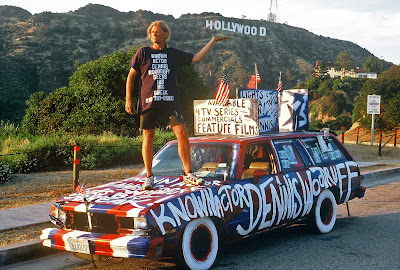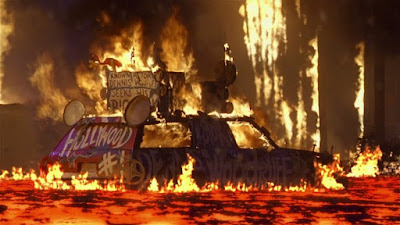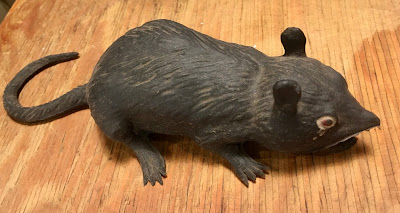Yeah, I know: what's a post doing here near the end of the month rather than in the usual First Sunday at 9:01 a.m. slot? First off, it's a re-run from a long time ago, exhumed from the archives, so I suppose it really doesn't count. Second, it concerns the Oscars, which will be broadcast tonight -- for better or worse. Third, I've been working pretty hard on the book lately, which hasn't left much energy for coming up with fresh posts. I really want to get the book done -- or at least have it ready for print -- by the end of this year, assuming we aren't all rotting under a mountain of radioactive rubble by then.
This is a version, more or less, that might end up in the book -- if it survives the cull. That's a big "if" though, because the rough draft as it currently stands feels a bit like ten pounds of shit crammed into a five pound bag ... so we'll see. I've corrected a few errors and cut some stuff from the original post, and more editing will doubtless be needed before the final cut.
So, if you watch the Oscars tonight, enjoy the show.
Oscar's Big Night
March, 2008
“It is hard to laugh at the need for beauty and romance, no matter how tasteless, even horrible, the results of that are. But it is easy to sigh. Few things are sadder than the truly monstrous.”
Day of the Locust, by Nathanael West
I first read Nathanael West’s dark reflection on the film industry shortly after arriving in the smog-choked arena of Los Angeles. Fresh off the turnip truck, I was abysmally ignorant in the ways of the Industry, and eager for insights on the nature of Hollywood, my new home-away-from-home. Day of the Locust was a lurid, entertaining, and memorable read, but seemed a bit dated as a product of its time, and more than a little over the top.
Thirty years after that first read — and considerably wiser in the ways of Hollywood — I must now offer a belated apology to the late, great Mr. West, who got a lot more right than wrong in nailing Tinsel Town to its very own gilded cross. West scraped off the pretense and phoniness layered atop our industry like six inches of sugary-sweet frosting to reveal the bitter cake of greed, fear, and insecurity below. Much has changed since 1939 — the advent and ever-expanding reach of television, the dazzling evolution of camera, lighting, and post-production technology, and a massive increase in the population of Southern California — but the essential truths underlined by Nathanael West still hold.
Last Sunday was Oscar Night, Hollywood’s annual air kiss into the brightly lit mirror of onanistic narcissism, a self-congratulatory salute to everything the Industry holds dear. There’s nothing wrong with acknowledging excellence in the cinematic arts, but the perverse obsession with celebrity the Oscar broadcast represents, promotes, and feeds on feels all too creepy, as does the tired ritual of crowds gawking as youth, beauty, and fame march arm-in-arm up that famous red carpet. The broadcast has metastasized over the years into a carnival of glittering tedium as the seemingly endless parade of winners lurch from the relative anonymity of the audience up those steps and into the spotlight, there to clutch their little gold man and blubber thanks to their agents, managers, lawyers, and other Hollywood leeches.
I don’t have to like it to understand what’s going on. In a business famous for coddling the unconstrained egos of narcissists who are cursed with a deep rooted need to be “loved” by faceless legions of total strangers — and for behind-the-scenes backstabbing in a desperate, zero-sum struggle to ascend the slippery ladder of Hollywood success — the annual group-hug by and for inmates of this gilded asylum makes a certain sense, but it made a lot more sense back in the old days when the Oscar ceremony was a private affair. All that changed when NBC took the Oscars public for the Academy’s first television broadcast in 1953, turning a relatively quiet celebration of Hollywood insiders into a bloated spectacle meant to boost the box office prospects of the winners while inducing millions of viewers to sit through four hours of commercials.
Everyone directly involved with a nominated film — actors, writers, directors, and producers, along with highly skilled below-the-line craftspeople — has a vested interest in the Oscars, and in a big little town like Hollywood, most of us know somebody connected to a film in the running. Still, I still have a hard time understanding why anybody outside the Industry would care what movie wins Best Picture, or which actor, actress, or director takes home a little golden statuette. It astonishes me that so many people are willing to line up outside the Kodak Theater to wait hour after hour on a chilly February afternoon just to catch a fleeting glimpse of a few movie stars, but they do, year after year. Although the LA Times complained that “only 33 million people” watched last Sunday night, that’s more than ten percent of the entire U.S. population, representing a huge public appetite for such a tediously weepy extravaganza. The audience may be aging, and the numbers slumping from past broadcasts, but a lot of people still seem to love the Oscars.
I tried to enjoy the event during my early years in the biz, dutifully tuning in on Oscar Night. Having worked so hard to become a tiny cog in the vast Hollywood Machine, I felt a sense of belonging, along with a certain obligation to observe the rituals of the clan. I was finally part of Hollywood — if only as a bottom feeder, far below-the-line — and when in Rome, one does as the Romans.
As my work shifted from low-budget features to commercials and music videos, the Oscars began to lose their relevance. I finally opted-out altogether, ignoring Oscar Night for twenty years until breaking tradition to watch during the year Charlize Theron won for a performance in which she transformed her lithe and lovely self into a monstrously grotesque homicidal prostitute. In a way, this seemed like the flip-side of the transformation Hollywood itself goes through every year for the Oscars, morphing from its true Industrial self — a soulless beast that cares only for money — into a glittering, beautiful blonde lighting up the world with her ten thousand watt smile. If this sounds a bit harsh, remember that the business of Hollywood has always been ruthlessly bottom-line, leaving countless starry-eyed dreamers battered and broken in its wake. Perhaps this is the fate of dreamers everywhere — romantic idealism left mugged and bleeding on the mean streets of reality — but the beatings meted out by Hollywood are particularly bruising.
Still, the Oscars are hardly the worst offender among awards shows. For the lamest, most purely commercial award circus, the Grammys takes the cake every year. Lest there be any doubt, consider two words that sum up the Grammys in a nutshell: Millie Vanilli. To the Grammys, quality is measured in terms of gross sales figures, which is why it represents all that’s hollow, rotten, and ruthlessly corporate in the music industry.
Finishing a distant second in the Award Show Hall of Shame are the Emmys, which slavishly follow the party line of conventional Industry wisdom when it comes to bestowing awards. This isn’t to suggest that those who receive Emmys aren’t deserving, but the awards committee remains grimly determined to take no risks whatsoever. Go out on a limb to reward a quirky, innovative show that hasn’t yet managed to attract millions of advertiser-pleasing eyeballs? Forget it, kid. That’s not how the Emmys roll.
This is all just one juicer's opinion, of course. De gustibus non est disputadum, the ancients tell us, and plenty of otherwise good, reasonable people enjoy the Grammys and Emmys. The best I can say is that both shows make the Oscars look good in comparison, but since that’s a grading curve equivalent to judging the offerings of a Third World whorehouse, such comparisons don’t count for much.
Ignoring the Oscars isn’t really an option when you live in Hollywood, where half the streets are blocked off, helicopters hover overhead all day, and far above, the Goodyear Blimp drifts in fat, lazy circles among the patchy clouds like a plump silver and blue whale. Out of curiosity, I tuned in just as Regis Philbin was winding up his one-man orgy of groveling self-humiliation, then watched the first half hour of the broadcast, which was more than enough. With all due respect to Daniel Day-Lewis, Javier Bardem, Marion Cotillard, Tilda Swinton, and the Cohen brothers — hey, congratulations to everybody in the Kodak Theater, winners and losers alike — I turned off the television.
Given that life is usually more fun inside with the party rather than pressing one’s nose against the glass peering in from the cold, you might wonder if there's a reason for my sour attitude towards Oscar, some private grudge I’ve nursed all these years that’s turned me against Oscar’s Big Night.
Well … yeah. Beyond finding the broadcast stupefyingly dull, there’s been a small, sharp Oscar-shaped bone stuck in my figurative craw for three long decades. Very early in my career, I worked on a film that won an Oscar. In 1978 — when The Deer Hunter was awarded Best Picture, Jon Voight and Jane Fonda won for Coming Home, Christopher Walken took Best Supporting Actor, and Michael Cimino beat out Alan Parker for Best Director — a film called Teenage Father, written and directed by the young Taylor Hackford, received the Oscar for Best Live Action Short. It was barely half an hour long (short films by definition being short), but the golden statuette Hackford held in his sweaty palms that night was just as big and shiny as Jane Fonda’s, and as far as Hollywood is concerned, winning an Oscar for anything is the industry equivalent of receiving the Congressional Medal of Honor. There is no higher award in this town.
So did I get a golden statue? Of course not. Did I deserve one? Absolutely not — as a wet-behind-the-ears swing man on a three man grip/electric crew, I was lucky to get the job in the first place. Other than an occasional technical achievement award, neither grips, juicers, nor gaffers are eligible for Oscars. The closest any of us ever comes is when a film we worked on wins for Best Cinematography, which represents a combined win for the grip, set lighting, and camera departments. If we’re lucky, the winning D.P. will remember to thank his/her crew before walking offstage holding his little gold man.
Other than the paycheck, the only thing I deserved was a credit: my name somewhere near the bottom of the crawl at the end of the film. Credits are a throwaway, the cheapest of perks doled out to those who do the heavy lifting essential to making any film. If you’ve ever sat through the full ten minutes of credits at the end of a feature, you know that everybody who worked on that movie — from the lowest production assistant to the executive producer — gets a credit. Whoever you are, and whatever your job on the production, you get to see your name in the credits. It’s part of the deal, just like getting paid. Although many will deny this, don’t think for a moment that we crew members won't sit there in the dark waiting for our names to appear up on the screen. As silly as it seems, we all do it. Film credits may be essentially meaningless, but they still matter.
Not on Teenage Fathers, though, where none of us — not the Gaffer, Key Grip, or me, the lowly swing-man — received a credit at the end of that film.
This was one of my first lessons in The Way Hollywood Works. It wasn’t the last.
Am I bitter? Nah. I got paid for my work, and that’s enough. Hey, this is America, where the money’s what matters, right? Right … but that money is thirty years gone, and there wasn’t all that much of it to begin with. Short films are made on equally short budgets, and I’m sure the producer was just trying to save a few scarce dollars by skimping on the credits, but to this day I feel a tiny surge of adrenaline every time I hear the name “Taylor Hackford.” Not only did he win that Oscar, then go on to enjoy a richly rewarding Hollywood career, but he got to marry Helen Mirren, a wonderfully talented actress and the sexiest sixty-something woman in the world.*
So I raise a glass in this post-Oscar week to my fellow grip/electrics on that film, Mike Popovitch and Josh Rich, who taught me a lot when I knew next to nothing. We didn’t get the credit, but thirty years ago our efforts helped win an Oscar. Not everybody in this town can make that claim, and not even Taylor Hackford — or our missing credits — can take it away from us.
* Yes, as a matter of fact I AM jealous...



















